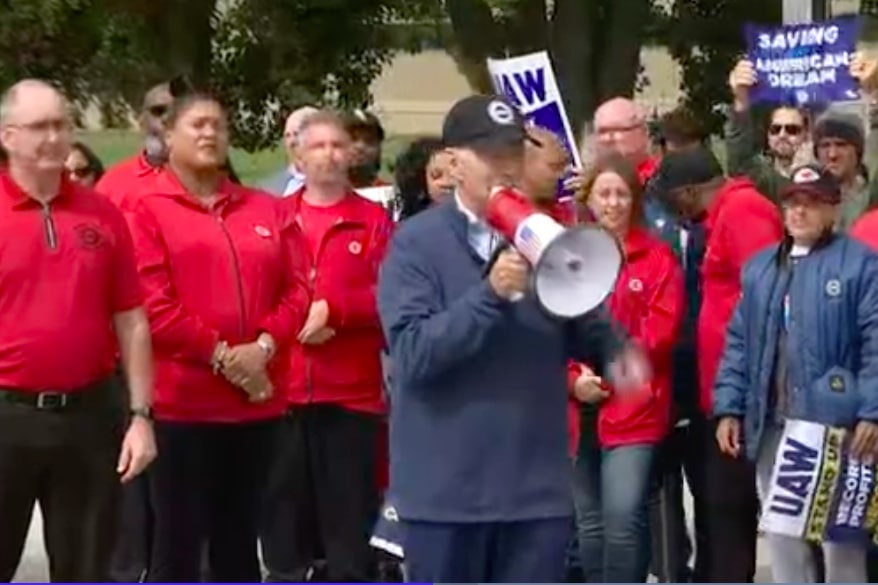President Biden on Tuesday joined striking United Auto Workers in Wayne, Michigan, becoming the first sitting President to visit a picket line.
Unlike several other unions, the UAW has yet to officially endorse Biden, who touts himself to be the most union-friendly President in U.S. history. But UAW President Shawn Fain, who’d invited Biden to join the picket line, appeared to come awfully close on Tuesday.
“Our President chose to stand up with our workers for economic and social justice,” Fain noted on Tuesday, speaking to striking workers joined by Biden. “Today I just want to take a moment to stand with all of you, with our President, and say thank you to the President. Thank you, Mr. President for coming. Thank you for coming to stand up with us in our generation’s defining moment. And we know the President will do right by the working class.”
Fain had met Biden at Detroit Metropolitan Wayne County Airport in Romulus, Michigan. Earlier this year, the UAW boss had been critical of Biden, especially for his Administration’s financial support of a transition by the auto industry from traditional gasoline powered cars to electric vehicles, which the UAW sees as a threat to its members’ jobs.
The UAW’s strike began at midnight September 15 when contract agreements to cover the union’s 145,000 members could not be reached, leading to the first-ever nationwide UAW strike being called simultaneously at all of the Big Three automakers in Detroit.
The first wave of the walkout included some 13,000 UAW members at three plants: General Motors in Wentzville, Missouri; Ford in Wayne, Michigan; and Stellanits in Toledo, Ohio. But this past Friday UAW president Shawn Fain announced he was extending to walkout to include union members at 38 parts distribution facilities across 20 states at GM and Stellantis plants—though not at Ford facilities.
During a livestream event Friday, Fain said Ford had come to the table over sticking points like profit-sharing and pay-tier structures and temporary employees, and thus was exempt from the extended walkouts. However, the UAW president added that there was still ground to cover with Ford.
On Monday, Ford echoed the union, stating that “significant gaps” remained amid issues that were “interconnected and must work within an overall agreement that supports our mutual success.”
On Tuesday Ford announced it was going to pause work on a $3.5 billion Michigan electric vehicle battery plant—a move that Fain called “a shameful, barely-veiled threat by Ford to cut jobs.”
On Tuesday in Michigan, President Biden addressed workers on the picket line through a bullhorn, saying, “You guys, UAW, you saved the automobile industry back in 2008….You made a lot of sacrifices. You gave up a lot. And the companies were in trouble. Now they’re doing incredibly well. And guess what? You should be doing incredibly well, too.”
On September 15 when the UAW first went on strike, Biden urged the automakers to ensure that workers are given their “fair share” of the “record corporate profits” the Big Three automakers have enjoyed in recent years.
The Big Three have proposed roughly 20% raises over the four-and-a-half year term of their proposed deals, though that is only half of what the UAW is demanding. The UAW at one point during the talks offered to lower its demand to 36%.
When a reporter shouted at Biden Tuesday, “What will it take to get to UAW endorsement?” the President responded, “I’m not worried about that.”
On Wednesday, former President Trump, the front-runner to be his party’s 2024 presidential candidate, will address workers at a gathering at an auto supplier. The supplier, Drake Enterprises, is a non-union manufacturer, according to a spokesman at the AFL-CIO.


